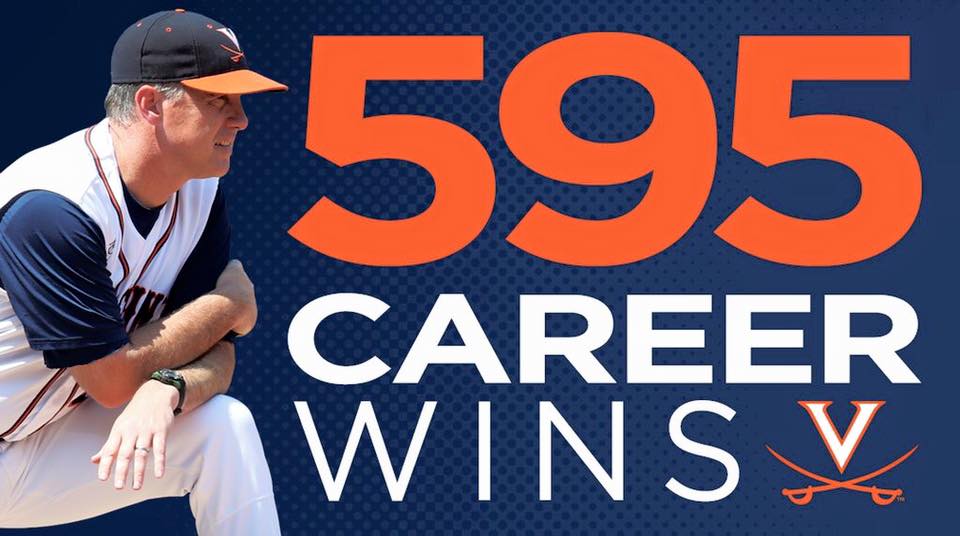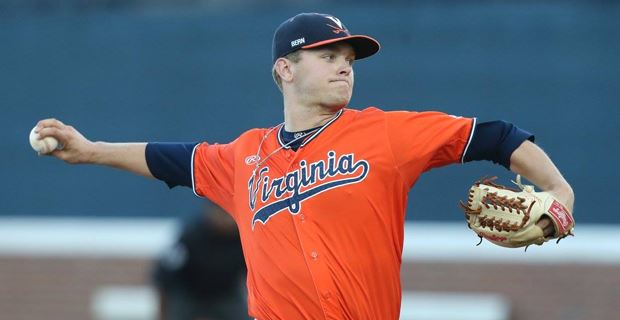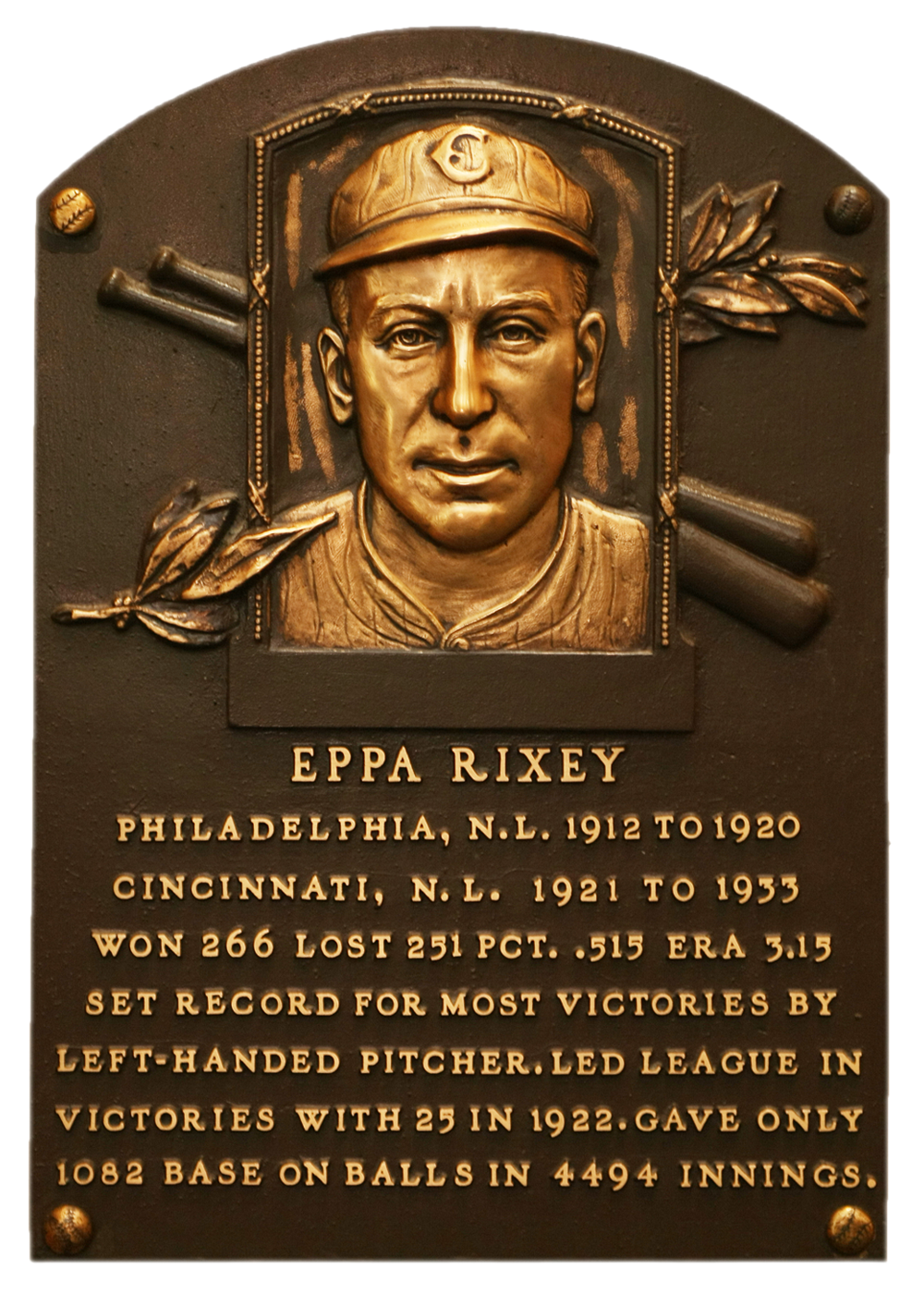Editor's note: Updates with weather-related schedule changes for Friday's first-round games.
The University of Virginia’s baseball team will make its 13th straight NCAA tournament appearance Friday at home at Davenport Field, beginning its quest to defend last year’s national championship.
If that (unlucky) number makes it seem like playing for college baseball’s biggest trophy has become a routine occurrence in Charlottesville, consider that only three of the previous 115 Cavalier baseball seasons ended with NCAA tournament berths.
This year’s road to Omaha, Nebraska (the perennial host city of the College World Series) begins at 11 a.m. with top-seeded UVA’s matchup against the No. 4 seed College of William & Mary, kicking off a four-team, double-elimination regional tournament. At 4 p.m., second-seeded Bryant University will meet third-seeded East Carolina University. Games will continue Saturday, Sunday and, if necessary, Monday. (Follow the action at virginiasports.com, Facebook, Twitter or Instagram.)
To counter the unlucky 13, here are a lucky seven things to know before you make your way to Davenport Field.
1. Brian O’Connor is The Man.
In 2001, a University committee seeking firmer financial footing for athletics recommended demoting several varsity sports, including baseball, to club status. Instead, the Board of Visitors opted to pump more resources into them, and two years later, Athletic Director Craig Littlepage hired Brian O’Connor, a bright, young pitching coach from the University of Notre Dame, to lead the baseball program.
O’Connor – nicknamed “Oak” – together with assistants Kevin McMullan and Karl Kuhn, immediately built a winner. All 13 of his teams have reached the NCAAs; four made it to Omaha. The 2014 squad reached the final series, and the 2015 team finally broke through and won it all.

Coach Brian O’Connor became UVA’s all-time wins leader during last weekend’s ACC Tournament.
The Cavaliers’ 7-2 victory over the University of Louisville on Sunday in the Atlantic Coast Conference tournament was the 595th of O’Connor’s career, making him the winningest coach in UVA history – in 10 fewer seasons than the previous record-holder, Dennis Womack, his immediate predecessor.
Under O’Connor, the Cavaliers have sent dozens of players into the professional ranks, and 10 ’Hoos have played in major league teams this season.
2. William & Mary is playing with house money.
There might not be a more improbable entry in this year’s NCAA field than William & Mary.
The Tribe was three outs from seeing its season end Saturday in the Colonial Athletic Association tournament, trailing the top-seeded University of North Carolina-Wilmington, 8-1, heading into the final inning. With a 27-29 record going into the game and one previous loss in the double-elimination tournament, another loss would be the end of the line.
The Tribe, however, rallied for seven runs to tie the game and force extra innings before rain from Tropical Storm Bonnie forced everyone to go home for the night.
Facing a midnight deadline to finish the tournament on Sunday (if not, UNC-Wilmington, the regular-season champion, would earn the league’s automatic NCAA berth), the storm finally relented in the late afternoon. William & Mary scored in the 12th inning for a 9-8 victory, handing UNC-Wilmington its first loss of the tournament.
The Tribe then defeated the Seahawks, 14-9, in the winner-take-all rematch to claim the CAA championship and the automatic berth in the NCAAs – concluding a series of occurrences that William & Mary coach Brian Murphy acknowledged was “pretty miraculous.”
Incidentally, UVA and William & Mary have met before this season, with the Cavaliers claiming a 16-8 victory on March 1.
3. Don’t sleep on Bryant.
The power in college baseball definitely tilts toward the South; seven of the NCAA tournament’s eight national seeds and 13 of 16 regional host teams – the top teams in the field – come from either the Atlantic Coast or Southeastern conferences.
But the Bryant University Bulldogs – the pride of Smithfield, Rhode Island – have won more games this season (47) than anyone else. They are the first Northeast Conference team to earn a No. 2 regional seed, and have amassed at least 42 wins in three of the last four seasons.
Bryant has its own standout coach. In his 25-year career as a head coach at the Division III and Division I levels, Steve Owens has never had a losing season, with a career record of 813-412-2 (a .663 winning percentage). Bryant has won five straight regular-season Northeast Conference championships, and Owens has been named the conference’s Coach of the Year four times.
4. UVA and East Carolina have a history.
East Carolina won’t need directions to Davenport Field. The Pirates and Cavaliers have met 18 times since the 2010 season; while UVA has won 14 of those contests, two of ECU’s four wins came in late April, when they won a three-game weekend series in Charlottesville.
East Carolina has also made a previous NCAA regional appearance at Davenport. Virginia defeated the Pirates, 13-1, in the 2011 regional final on its way to its first College World Series appearance.
ECU, which finished second in the American Athletic Conference regular season standings, is playing in its 28th NCAA tournament. The Pirates went 13-7 against teams in this season’s NCAA field.
5. Watch how UVA’s pitchers are deployed.
College baseball teams save their best starting pitchers for conference games, which are generally played in three-game weekend series. Usually, the best pitcher throws Friday, the second-best on Saturday and the third-best on Sunday.
UVA’s usual Friday night starter is junior right-hander Connor Jones, runner-up for ACC Pitcher of the Year with an 11-1 record and a minuscule 2.29 earned-run average. He has been followed by junior righty Alec Bettinger (2-5, 5.69 ERA) and sophomore lefty Adam Haseley (9-3, 1.73).

UVA coach Brian O’Connor isn’t saying when ace Connor Jones will pitch.
By the numbers, Haseley has been more effective than Bettinger, but he is also UVA’s starting center fielder. If he pitched on Saturdays, he would have to be held out of the lineup on Sundays to allow his arm time to recover.
In NCAA regional play, the No. 1 seed – in this case, Virginia – matches up against the No. 4 seed (William & Mary) in the first round. If O’Connor wants to keep his normal rotation intact, he would send Jones to the mound against the Tribe. But that would mean using a “lesser” pitcher in the next round, against either the second or third seed.
So another possible strategy would be to send either Bettinger or Haseley to face William & Mary, and save Jones for a later, possibly more difficult (on paper) game.
Asked about his pitching plans earlier in the week, O’Connor declined to tip his hand, but noted that the objective of the weekend was to win the whole regional and advance to the super regional round. That might suggest some tinkering with the usual pitching order.
6. Keep an eye on Lubbock.
The winner of this weekend’s series will face the winner of the regional being hosted by Texas Tech University in Lubbock, Texas, in the super regional round, a head-to-head, best-two-out-of-three series with a trip to Omaha on the line.
If both top regional seeds, UVA and Texas Tech, win this weekend, the Cavaliers would travel to Lubbock for the super regionals next weekend. But if someone upsets the Red Raiders – the other teams in Lubbock are No. 2 Dallas Baptist, No. 3 New Mexico and No. 4 Fairfield – and UVA wins, the Cavaliers would host the next round.
So Texas, the eyes of Virginia will be upon you.
7. A fun piece of trivia to round out the lucky seven.
UVA has been playing baseball since 1889, but only one former Cavalier is enshrined in the Baseball Hall of Fame in Cooperstown, New York. And no, he did not play for Brian O’Connor.
Eppa Rixey was born in 1891 in Culpeper, and moved to Charlottesville when he was 10. At UVA, he starred in basketball (he was 6-foot-5) and baseball before graduating in 1912 with a degree in chemistry.

Culpeper native Eppa Rixey is the only former Cavalier in the Baseball Hall of Fame.
Professional baseball players of that era were a rough-hewn lot, and Rixey initially showed little interest in playing for pay. But as Jan Finkel wrote for the Society for American Baseball Research website:
Rixey jumped from the Virginia pitching staff to the [Philadelphia] Phillies through the efforts of National League umpire Charles (Cy) Rigler, who was moonlighting on the basketball and baseball staffs of the university. Rigler suggested the move to Rixey, who initially refused, saying he planned to be a chemist. Rigler sweetened the deal by promising to split equally with the young pitcher whatever finder’s bonus he might receive from Philadelphia, which turned out to be $2,000. Rixey agreed because the United States was suffering an economic downturn in 1912, his father’s bank was taking some losses, and he wanted to help his younger brother William (who became a physician) stay at Virginia. However, the league passed a rule prohibiting umpires from scouting for any individual team, and neither Rigler nor Rixey ever saw a dime. Nevertheless, Rixey joined Philadelphia in 1912 after graduating from Virginia.
Rixey went on to pitch 21 seasons for the Phillies and the Cincinnati Reds, compiling 266 wins (and 251 losses) for mostly second-division teams. His win total was a National League record for left-handers until Warren Spahn surpassed it in 1959.
Rixey also led an interesting life off the field. He earned a master’s degree in chemistry from UVA, and missed the 1918 season to serve with the Chemical Warfare Division in Europe during World War I. During the winters, he taught Latin at Episcopal High School in Alexandria and wrote poetry in his spare time, “particularly enjoying sonnets and triplets,” Finkel wrote.
Known as a fierce competitor, Rixey’s best years came in Cincinnati, where he won 100 games in his first five years and played 13 seasons overall before retiring in 1933. In 1921, he set a record that is unlikely ever to be matched, yielding one home run in 301 innings pitched.
Rixey was elected to the Hall of Fame in 1963, but died before the induction ceremony.
Media Contact
Article Information
June 2, 2016
/content/seven-things-know-heading-davenport-field-weekend

